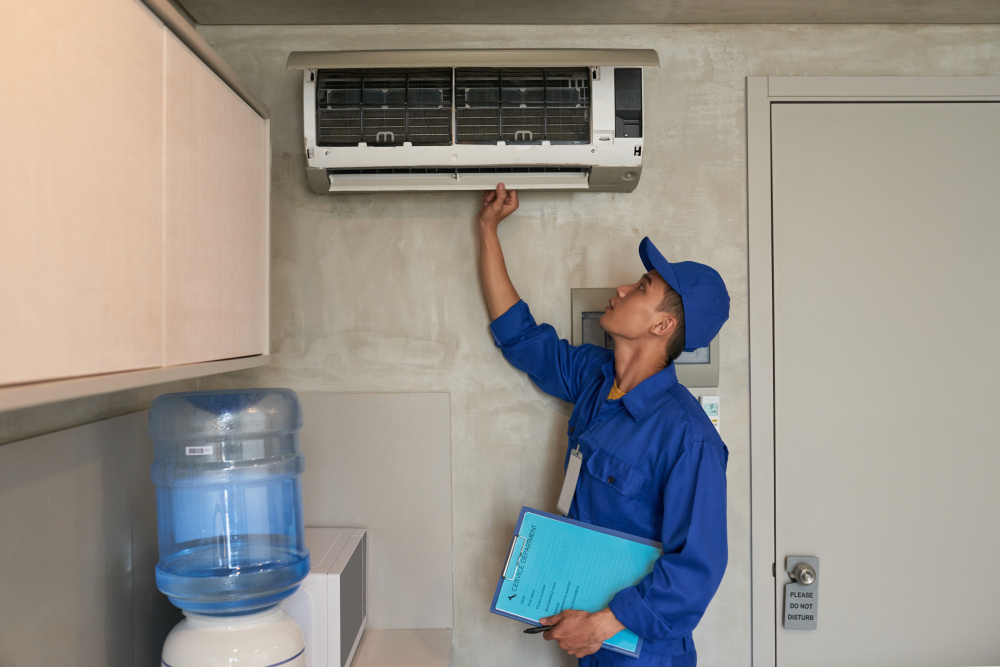Dripping noises from your air conditioner can be more than just an annoyance; they can disrupt your quiet home environment and even keep you awake at night. Moreover, when the AC is making a noise, it often indicates underlying issues that, if ignored, can lead to larger, more costly repairs. Understanding and addressing the source of these dripping noises is not just a matter of comfort but preventative maintenance.
This article aims to help you diagnose the causes of the dripping noise from your air conditioner and provide practical solutions to rectify these issues. Consider this your go-to guide for transforming that annoying drip into a sound of silence. Read on for more information.
What Is Dripping Noise From AC?
So, what exactly is this dripping noise emanating from your air conditioner? It is the sound of water or condensation dripping inside your AC unit or its components. Contrary to what some may believe, your working AC isn’t just blowing cool air—it’s also working tirelessly to reduce humidity in your home, which can lead to the presence of water within the system. This dripping noise can often disrupt the peaceful ambiance of your household and, more importantly, indicate potential issues within your AC system that may require immediate attention.
There may also be different types of noises that come with the dripping sound, such as hissing or gurgling, pointing to specific problems that must be addressed. But regardless of the kind of noise, it’s crucial to understand that any type of dripping sound should not be ignored.
Ignoring it might not just compromise the tranquility of your home but also the longevity and efficiency of your air conditioner, ultimately affecting your comfort and energy costs in the long run. Therefore, it is crucial to address this issue promptly and seek professional assistance to ensure optimal performance and reliability of your AC unit. The best air conditioner is a quietly functioning one, after all.
Different Ways To Stop Dripping Noise From Air Conditioner
Now that you know the significance of addressing the dripping noise from your air conditioning unit, dive into some practical solutions to stop it. Below are a few methods that you can try to identify and eliminate this issue.
Clean or replace the air filter.
When the air filter in your AC unit is clogged or dirty, it can reduce airflow and cause the system to work harder, resulting in condensation buildup. This accumulation of moisture can then cause dripping noises. Therefore, regularly cleaning or replacing your air filters can help prevent this issue.
Start by turning off your AC, finding the filter, and checking if it’s dirty or clogged. If so, you can either clean it using warm water and mild detergent or replace it with a new one. If you have a ventless air conditioner, simply remove the filter and clean it with a vacuum or rinse in warm water.
Check for clogged or blocked condensate drain lines.
Another common cause of dripping noise in air conditioners is clogged or blocked condensate drain lines. These lines are responsible for removing excess moisture from the AC unit, and if they become clogged, water can back up and produce that annoying dripping sound. The water can also cause damage to your AC unit and the surrounding area, making it crucial to promptly identify and fix this issue.
Locate the outdoor drain pipe and remove the cap to check for clogged drain lines. If water is not draining correctly, use a wet/dry vacuum to suck out any debris or buildup causing the blockage. You can also use equal parts vinegar and warm water to flush out any remaining debris. This method can help unclog the drain lines and stop the dripping noise from your AC.
Inspect the condensate pan for damage or cracks.
The condensate pan is another component responsible for collecting excess water from the AC unit. If it becomes damaged or develops cracks, water can leak and cause dripping sounds. Therefore, inspecting this pan for any signs of damage is essential when trying to stop the dripping noise.
Turn off your AC and locate the condensate pan beneath the evaporator coil. If you notice any cracks or damage, replace the pan with a new one. You can also use epoxy glue to seal small cracks and prevent them from getting bigger. If you’re unsure about your DIY skills, it’s best to seek professional assistance to ensure proper repair and prevent any future issues.
Ensure the AC unit is level and on a stable surface.
The dripping noise can sometimes occur due to an unlevelled or unstable AC unit. When the system is not on a flat surface, it can cause water to accumulate in certain areas and produce dripping sounds. To check if this is the case, use a level tool to ensure that your AC unit is positioned correctly.
If you notice that the unit is not level, you can use wooden shims or foam padding to level it out. You can also check the condition of the mounting brackets and tighten or replace them if necessary. Especially with a saddle air conditioner where the unit is mounted on the window sill, ensuring that it is level is crucial to prevent dripping noises.
Examine the refrigerant levels and check for leaks.
Low refrigerant levels or leaks in the system can also cause dripping noises from your air conditioner. When there is insufficient refrigerant, the AC unit may work harder and produce more condensation, leading to a persistent drip. This also puts a strain on the compressor and can cause long-term damage to the system.
If you suspect low refrigerant levels or a leak, it’s best to call a professional HVAC technician for assistance. They can accurately diagnose and fix any issues with your AC unit, ensuring that it runs efficiently and quietly. They can also perform regular maintenance checks to prevent any future problems.
Schedule regular AC maintenance to prevent issues.
An excellent way to prevent dripping noises and other AC issues is by scheduling regular maintenance checks. This allows HVAC professionals to regularly inspect, clean, and service your AC unit, ensuring optimal performance and longevity.
During these maintenance checks, they can also identify any potential problems before they escalate into more significant issues. By being proactive about AC maintenance, you can save yourself time, money, and the frustration of dealing with dripping noises and other problems.
Consider using a drip pan or noise-absorbing materials.
However, if you’ve tried all the above methods, and the dripping noise persists, consider investing in a drip pan or noise-absorbing materials. A drip pan can collect excess water and prevent it from causing damage or producing noise. Noise-absorbing materials, such as acoustic foam panels, can also help reduce sound transmission and minimize any remaining noises. You can also consider installing a sound blanket or baffle on the outside of your AC unit to further reduce noise.
Troubleshooting Tips and Precautions for DIY Fixes
Before you embark on any DIY fixes for your noisy air conditioner, it’s important to be fully equipped with the right knowledge and tools. Here are a few troubleshooting tips and precautions to bear in mind:
- Safety First: Always remember to switch off your air conditioner before conducting any repairs or maintenance. This is essential for avoiding any electrical mishaps or accidents.
- Have the Right Tools: Make sure you have all the necessary tools handy before you start your DIY fix. This typically includes a screwdriver, level, a clean cloth, warm water, mild detergent, and in some cases, a wet/dry vacuum.
- Don’t Force Anything: If any part of your air conditioner refuses to budge or open, don’t force it. This could lead to unintended damage. In such cases, it’s best to consult a professional.
- Reference the User Manual: Your air conditioner’s user manual can be a valuable resource when attempting DIY fixes. It often contains detailed instructions and diagrams that can assist you throughout the process.
- Know When to Call a Professional: While many issues are simple enough to fix on your own, some problems require the expertise of a trained HVAC professional. If you’re unsure about a repair or if your DIY fix didn’t solve the issue, don’t hesitate to call a professional.
- Keep a Regular Maintenance Schedule: Regularly maintaining your air conditioner can prevent many common issues from arising. Consider setting a recurring reminder on your calendar to check on the different parts of your air conditioner.
Remember, the goal of any DIY project is to fix an issue without causing additional problems. Therefore, make sure to exercise caution and patience throughout the process.
Bottom Line
Dripping noise from your air conditioner can be a nuisance, but it’s often an indication of underlying issues that require attention. Ignoring these noises can lead to more significant problems and costly repairs in the future. By following these tips and precautions, you can identify and fix the source of this noise, ensuring optimal performance and comfort for your AC unit. However, if the problem persists, it’s best to seek professional assistance to avoid any unnecessary damage or safety hazards. With regular maintenance and timely repairs, you can enjoy a peaceful and efficient air conditioning experience in your home. So, next time you hear that dripping noise from your AC, don’t ignore it; instead, take action and transform that sound of annoyance into one of silence.

